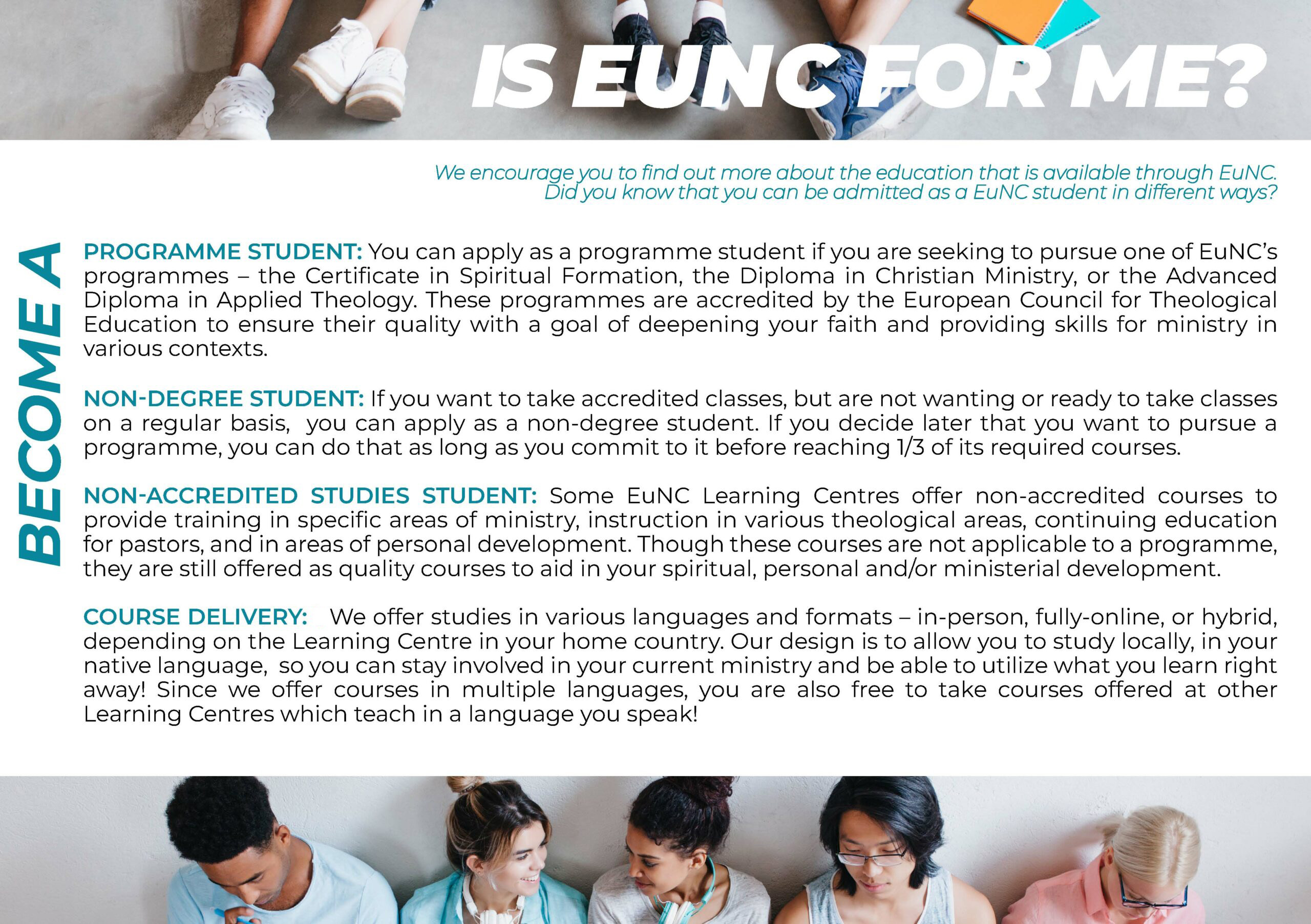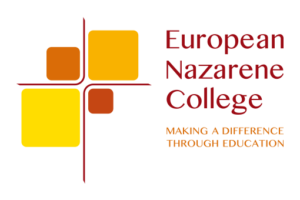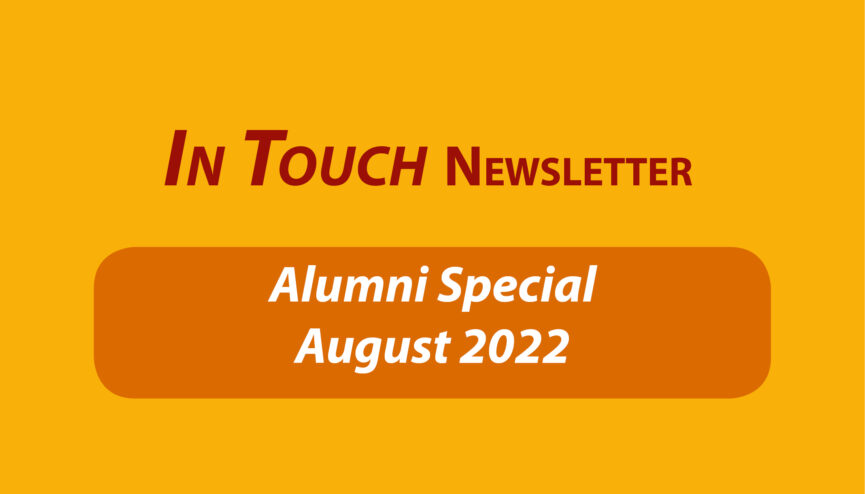Dear Friends of EuNC,
Our college has been around for more than 57 years. Many people have contributed to the growth and development of our college. While you at first might think of students, faculty members and rectors we want to highlight the crucial role of our alumni. They are the ones who have been sent from our college into the further kingdom of God, preparred for life, ministry and mission. They are the ones who can serve as no other as ambassadors for the school, as people who have experienced the impact of theological education on their call and lives. This Alumni Special gives the floor to our former students and their journey with EuNC. Our mission, Enabling Christlike Disciples for Ministry, has not changed. Our alumni are proof of how God has been faithful to our college and its students.
In all of this we are very thankful for your support over so many years!
On behalf of the entire EuNC Team
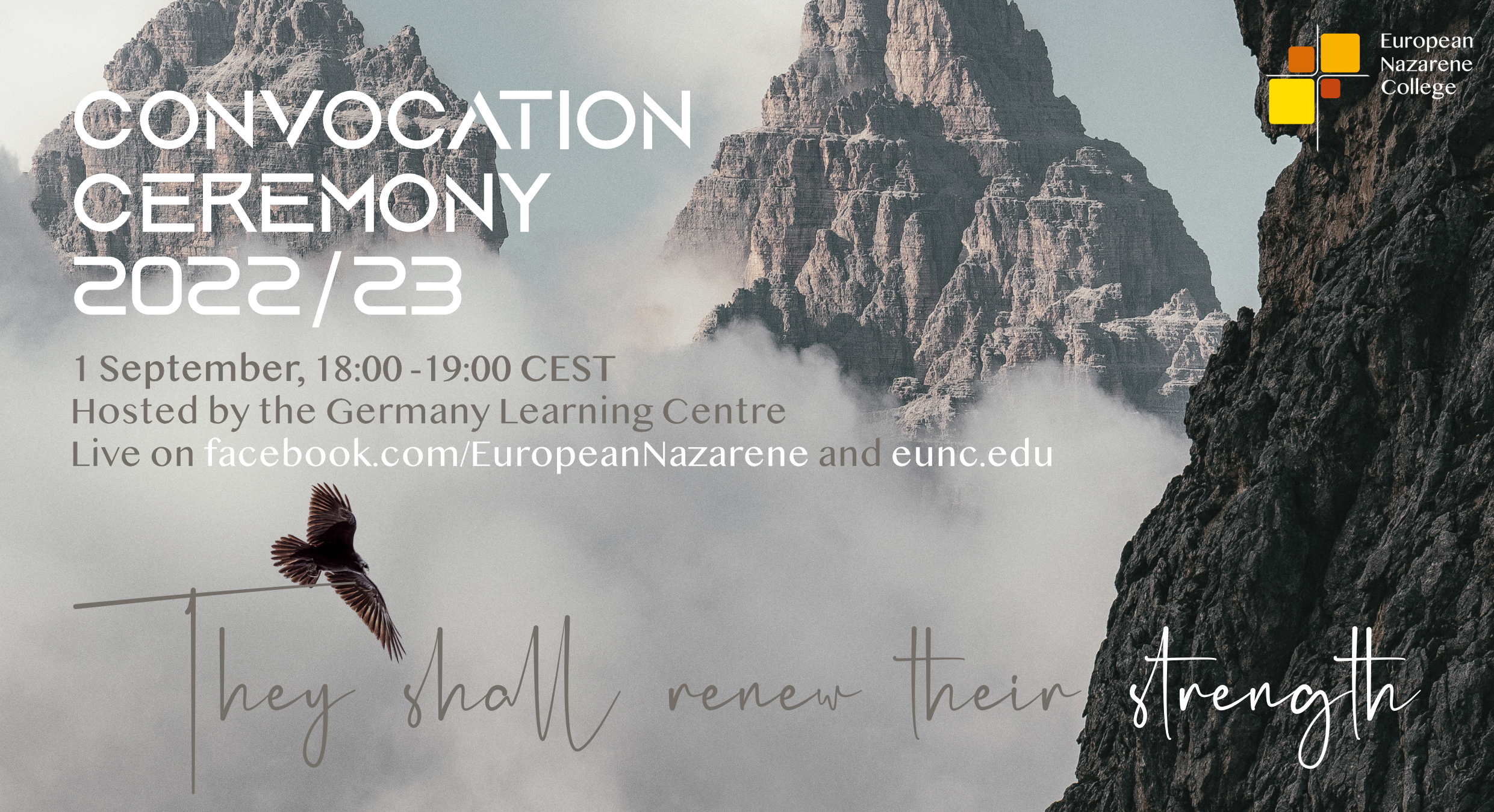
A Life-long Desire to Grow Spiritually
Anke Volckart Thorne was a student with EuNC in the late 80s. After graduating with the Certificate in Christian Ministry she continued studies in the US where she currently serves as a Mental Health Counsellor. We asked her about her memories of her time at our college.
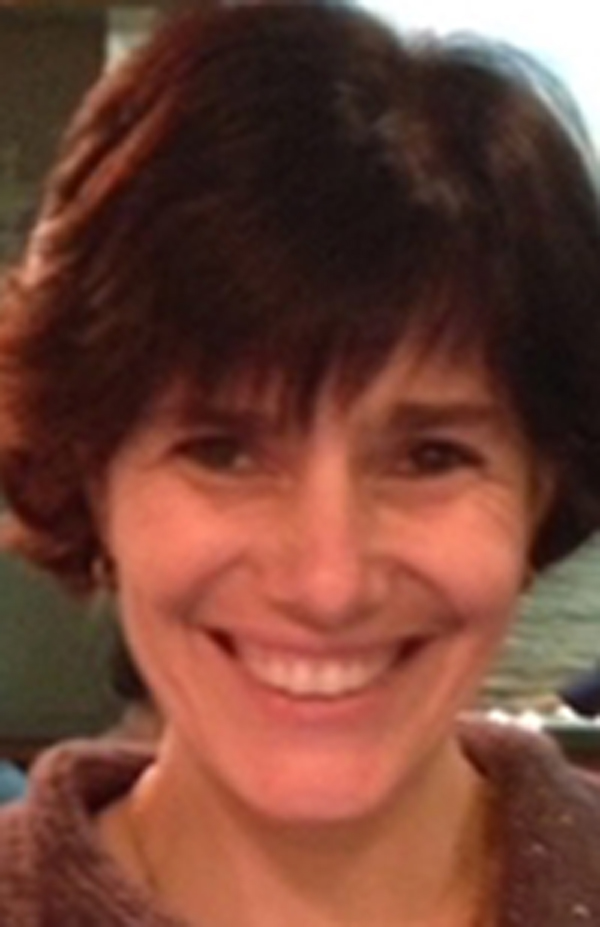
Anke, how did you decide to study at EuNC?
I decided to study at ENBC/EuNC just a few years after I had committed my life to Christ. Though I had grown up in a family of practicing Catholics, knowing that Christ is interested in me personally and desires a relationship with me, had been a new idea and experience for me. Professionally, I desired to become a mental health counselor and to study psychology. My decision to attend EuNC was meant to increase my knowledge of scripture and to strengthen my faith.
What were spiritual or other highlights from your time at EuNC?
The things I most fondly remember of my time at EuNC were late night gatherings to hang out with the multinational student body, to have fun, and to have wonderful conversations about faith and theology; walks along the Rhine or the fields surrounding the Campus; and the communal meals in the cafeteria. The sentence shared by my professor of ‘Introduction to Theology’ that I continue to understand as a truth for my own spiritual development is: ‘The longer I live, the fewer absolutes I have.’
What do you miss from your time at EuNC?
Living in community with people from different cultures and languages.
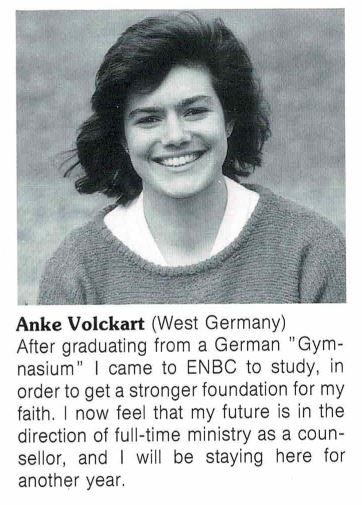
From the Alpine 1987
How has EuNC influenced you personally and professionally?
EuNC contributed to a life-long desire to grow spiritually and to maintain my faith as the most central part of my existence. Working as a mental health professional within religious institutions as well as in a private practice setting, awareness and acknowledgment of God creating humans as spiritual beings and being able to address spiritual and very existential topics has been invaluable.
Digging Deeper: An Archaeologist and the Importance of Theological Education
Roza Vardanyan is a recent graduate from our Armenia Learning Centre. In the new academic year she will join the faculty due to her training in the field of archaeology. We talked with her about her call, ministry and the importance of faith in her job as an archaeologist.
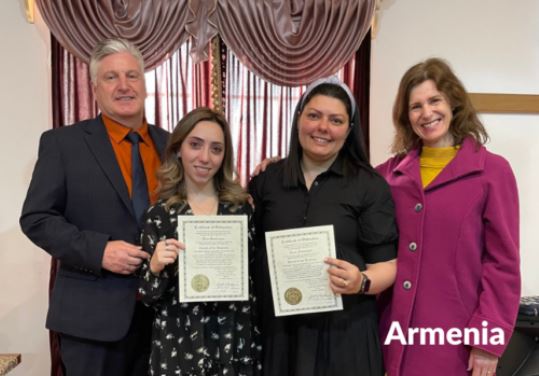
Roza Vardanyan (second to the left) was one of the first two female elders to be ordained in the Armenia District.
Roza, first of all Congratulations on your graduation from EuNC earlier this year and to your ordination as one of the two first female elders in the Armenia District, the other one also being a EuNC graduate.
Thank you very much. I have received many congratulations from people whom I do not even know and it inspires me a lot. This is what God's family looks like. You do not have to know someone personally to be happy for them.
Tell us about your calling – when you felt it, what it was to, and how you are filling it out.
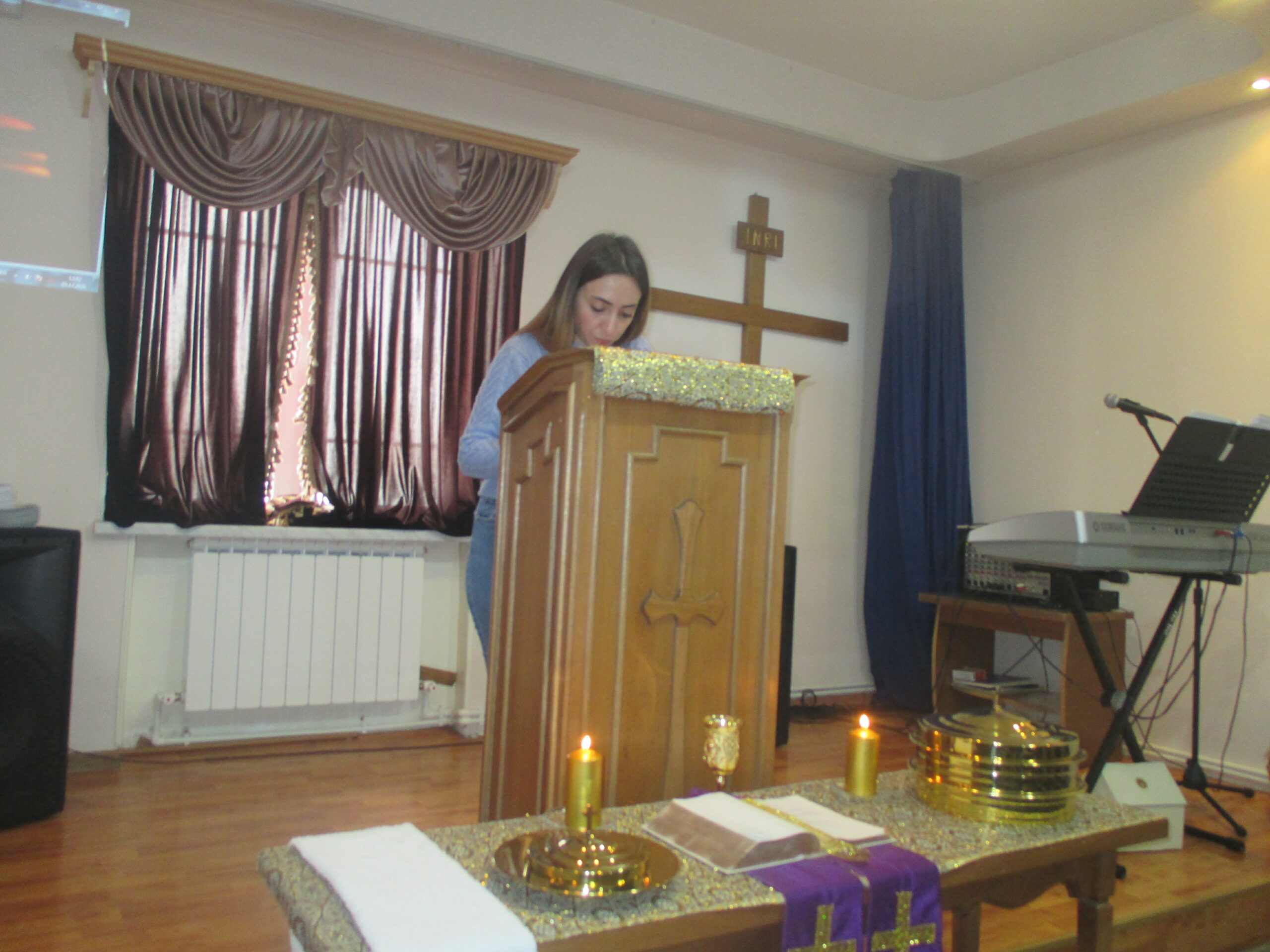
Roza preaching in her local church
I grew up in a pastor's family. Sometimes people think that you're just following your family's steps as your responsibility. But I have always had that feeling that I wanted to serve my God. It is a life that I have chosen for myself. I have always felt that I will have my own role in God's kingdom. I was ordained this year which is hard to believe. Women in ministry might be accepted in other cultures but in Armenia we need to go through many struggles. However, I feel absolutely proud to serve for God’s church.
I was a teenager when I started to think about what I could do for the church and for people. I started my ministry at a very young age when I was teaching music in our kids’ club. I remember being sure to get baptized when I turned eighteen. Then I started my studies at EuNC because I was thinking that one had to be knowledgeable to lead groups and people in church and confident in what you are teaching.
Later I started praying to find my ministry in the church. Not long after, our Field Strategy Coordinator recommended serving in missions. At first I was scared. I prayed for that inner confirmation that it is the right way for me. God showed me the story about Moses when he was scared to take part in God's plans. It is normal to think about your ministry and take your time to pray about it but once you have that feeling that God is with you, there is nothing that will stop you.
What were some key moments during your studies? Which courses shaped you the most?
When I started studying at EuNC it was challenging for me because of parallel studies in Armenia. I also worked so that I hardly had any free time to spend for myself. However, I can say that it was the best part of my Christian life. I felt God’s presence in every step of my life, he worked with me, showing me His ways. I loved courses about Missions and the ones that teach history and languages skills, Preaching courses, Old and New Testament. But the most powerful course for me was Hermeneutics. I can surely say that every single course helped me to develop my own understanding of God and how He works through people.
Tell us about the importance to study in your native tongue as well as in the Wesleyan-Holiness tradition, strengthening your Nazarene identity.
If your heart truly yearns for God and holiness, then neither culture nor ideology, nor people can keep you away from God.
I studied not only in Armenian, but also in Russian and I was lucky to study with the best professors. First of all, I must say that a perfect command of the language is only an advantage. It is very easy to learn in your own language and thinking. In that case, you will not have any unclear moments while studying. I must say that Armenian culture is a bit conservative and we are easily given the idea of holiness. Freedom is not given as a cultural heritage for Armenians. I will not deny that it is difficult when you already apply holiness in work. However, if your heart truly yearns for God and holiness, then neither culture nor ideology, nor people can keep you away from God.
What did it mean to you to be able to minister and serve in a local church while receiving academic theological education?
It was great to have the opportunity to serve and study at the same time because studies are nothing without practice. The more you know the more you want to give. Church has to grow and when we study, we have to use our knowledge for the growth of the church. It is crucial to have leaders who know a lot about our doctrine and about what we believe. That is how theological education helped me to develop my knowledge and that I is how I help other people as well.
You were recently elected as the NMI Coordinator for the Eurasia North Field. What movtivated you to take on this role?
First of all, I knew that it was my call and serving in NMI was my passion. My motivation was to give everything what I could to other leaders to mobilize our Churches in the Eurasia North Field. To be honest, the second time when our Field Strategy Coordinator told me to think about this role, there was no doubt that it was my ministry. It is such a blessing for me to be part of this ministry.
Your ministry with the Church of the Nazarene is only part of your calling. Your actual profession is being a historian-archaeologist. Tell us a little about what you do and what your job looks like.
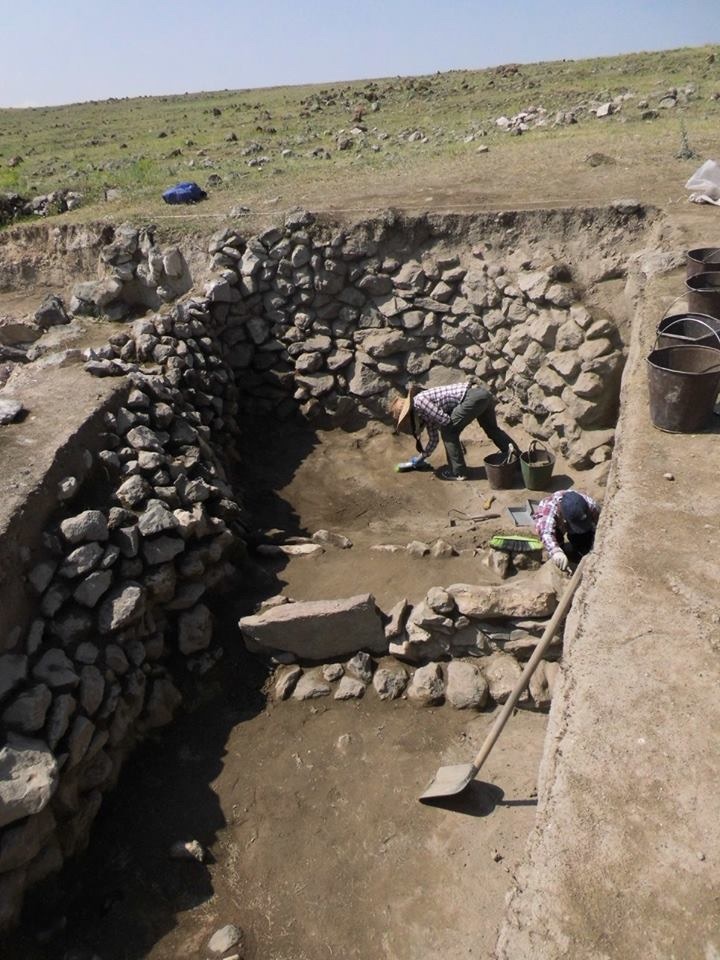
Roza and her team conduct excavations in tombs, castles, settlements and similar places. The main findings are from the territory of Gyumri in Armenia which has been inhabited from the 3rd millennium BC on.
I started studying at EuNC in 2013 and at the same time I was doing my M.A. studies at the University of Geography and History-Archeology here in Armenia. In 2015, I started to work as an archeologist and it was a life-changing experience for me because it was my dream that came true at that time.
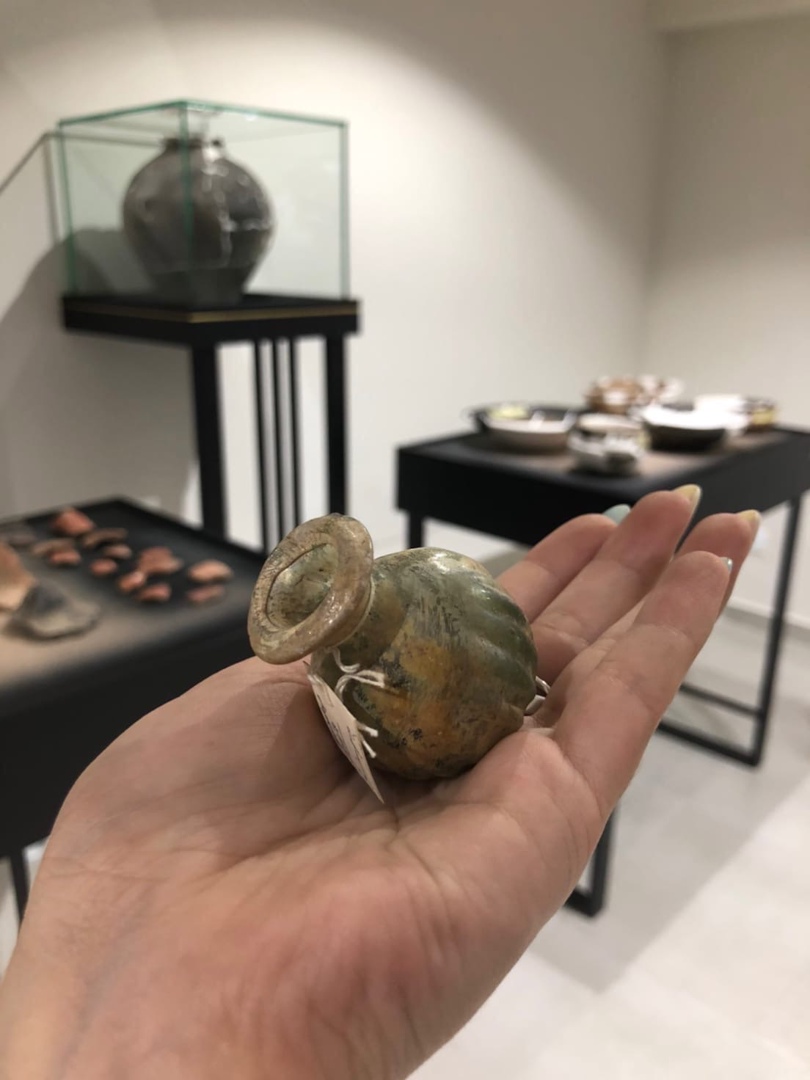
Items like a tiny bottle with fragrances or sheep statues were commonly placed in graves. People used to put the deceased’s belongings in the tomb so that, according to ancient beliefs, they would serve them in the afterlife.
In Armenia we have many historical places that we excavate. I have excavated many tombs, living rooms and castles which I find extremely interesting. You open something which you have no idea of until you investigate. The oldest tomb that I have opened was 5000 years old and it was an old underground residency place. You can imagine what an exciting moment it was to touch something that had not been used or held by someone for so many years. I love that you can understand how people lived in the ancient world and what they struggled with.
In which ways does your archaeological work correspond with your theological education and pastoral ministry?
To be honest it is not the best work for a Christian who lives in Armenia. Many scientists are non-believers and atheists. If a person does not have a strong spiritual beliefs, they might to manipulate you or say something negative about your spiritual life. I have been working with them for a few years, but with God’s help I have managed to uproot all the negativity they tried to sow and today I stay strong in my spiritual life. I know who I am, and I know who God is in my life.
If archaeological education would have been friendlier towards Christianity, what would your dream or your next step in life look like?
If I had such an opportunity, my next step would be to study biblical archaeology. But if there is not, I think that God's will is in everything. I do not complain about any situation, because if there is no such opportunity, then there is an opportunity to self-educate. In everything, you should look for what you can do yourself and contribute, only then you will see a clear result.
What advice can you give to someone who might be fully involved in their job but would like to grow in their theological knowledge or be more involved in ministy?
Theological education should not be a question of choice. That is the way every Christian should go through.
It is always hard to choose between what you love and what you need, and it is even harder to combine them. It can take your time, your energy, sometimes it makes you exhausted because it is a long journey but at the end it is worth it. Go for everything but always manage your time properly otherwise you will lose it all.
Theological education should not be a question of choice. That is the way every Christian should go through. You need a strong will, endurance and clear goals so that you do not lose what you believe in. If you do not have a theological education, you will never be able to teach about God. The principles, goals, and spiritual views that the church has can only be obtained through theological education. Every flower needs time and investment to grow, which will lead to a beautiful result in the future. If we want to have a strong generation of leaders, we must start with ourselves. We need to know every detail and then teach others how to live. God works differently in everyone's life, and we must understand that we should not educate others with our lives, but only with the Word of God. Nothing should be the reason to lose your faith.
There are difficult times in everyone’s life, and we should not criticize people, but try to understand how we can help others which we can only do by receiving theological education.
You are an archeologist with a theology degree and one of the two first ordained female minister in the Church of the Nazarene in Armenia. You have also become a faculty of your alma mater college. Congratulations! What is your vision now? What would you like to see in your country and church? How would you encourage people in Armenia to study at EuNC?
I am currently preparing for my first class to teach in September which will be Church History course for Armenia. Now I am translating the course and I am preparing for upcoming children's and youth camps in the church. My goal coincides with the vision of the church and I think that I will do what is required of me to spread the Word of God in Armenia and in different areas. The mission service is currently recruiting leaders and waiting for the addition of the team. I think everything is still to come. During camps and services, we always talk to people to get them involved in learning as well.
What else do you want to say to the readers of the EuNC newsletter, or share from your studies and ministry?
Theological education is a long process in which we do not only discover who God is, but we also discover ourselves in God. We begin to understand who a person is and what we need to know during trials. Sometimes you get tired on the road, you think it takes too long, that it is not worth the effort, but when you see yourself at the end of the road, you realize how much you have changed, and how much God has changed your surroundings.
A successful leader is one who wants to develop spiritually. It is never easy to be in the ministry, but the result you achieve justifies the way you have gone through. When we read the Bible we see the story of the heroes in the beginning and in the end. At first, they do not see the result, but in the end, they always remember where they started. There is no result without investment.
